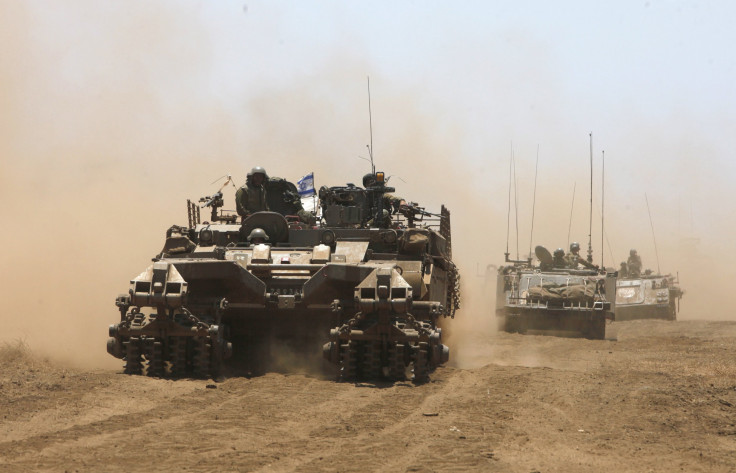Israel Worriedly Watches Syrian Border Situation, As Fighting Gets Close To The Golan Heights

Tensions are rising on the border between Syria and Israel, as fresh clashes between rebels and forces loyal to the Syrian regime erupted Wednesday. Israel now risks being dragged into the conflict next door as fighting comes closer to the border and threatens the Druze community, which also has a presence in Israel and whose members may attempt to flee across the border.
Fighting came close enough to Israel Wednesday that it set off missile-warning sirens in northern Israeli towns. At least 33 people were killed in clashes between rebels and some fighters from Jabhat al-Nusra, al Qaeda’s branch in Syria, Wednesday afternoon in Quneitra province. Rebels had surrounded a predominantly Druze and pro-regime town on the Syrian side of the Golan Heights.
The Druze town of "Hader is now totally surrounded by rebels, who just took a strategic hilltop north of the village,” Rami Abdel Rahman, director of the Syrian Observatory for Human Rights, told Agence France-Presse. “The regime has not sent reinforcements yet, but the Druze villagers are standing with the government.”
Syria’s Druze minority had largely refrained from siding with either the rebels or the regime since the war broke out in 2011. However, fighting in Idlib province and in southern provinces neighboring the Druze heartland of Sweida has increased over the past two weeks, forcing some to take up arms and defend their land. Last week, Jabhat al-Nusra militants targeted Druze civilians in the Idlib province, executing at least 20 civilians and prompting outrage from Druze communities in Syria, Lebanon and Israel.
The Druze are a religious and ethnic minority with a history of persecution for their beliefs. Today, the majority of the 1.5 million Druze live in Lebanon, Israel, Syria and Jordan, where they tend to live in predominantly Druze areas. The Druze faith is monotheistic and originated from the Ismaili sect of Shiite Islam, but many Druze today do not consider themselves Muslim.
"We are closely watching the situation on the border. I ordered to do everything necessary,” Israeli Prime Minister Benjamin Netanyahu said at a special Wednesday session in the Knesset, Israel's parliament.
Netanyahu did not give further details on whether or not Israel would get involved in the Syrian conflict to protect the Syrian Druze, nor did he discuss the issue of Druze refugees who may be fleeing toward Israel.
Unverified pictures purportedly depicting Syrian Druze fleeing toward the Israeli border #Syria #Israel pic.twitter.com/y5envRBDKC
— Michael Horowitz (@michaelh992) June 17, 2015Unconfirmed photo reports that circulated Wednesday showed Syrian Druze reportedly attempting to cross the border into Israel, fleeing violence that had reached their doorstep. On Monday, men waving Druze flags were inspecting vehicles crossing the border to reach the field hospital on the Israeli side, in order to make sure no militants with Jabhat al-Nusra or the Islamic State group got through, according to a video posted to social media.
“The Syrians should stay in Syria, and if they reach the fence -- we will interrogate them,” a senior Israeli Defence Forces official told Israeli media on Wednesday. “We won’t let people enter Israel just like that.”
Israeli #Druze in Beit Jaan March in solidarity with their brethren in #Syria pic.twitter.com/VetvBMPQp9
— Ben Hartman (@Benhartman) June 17, 2015However, many of Israel's roughly 120,000 Druze have taken it upon themselves to support their kin across the border. The Golan Heights, which overlook Syria, are home to roughly 20,000 Druze -- the majority of whom do not hold Israeli citizenship.
Druze residents of the Golan town Majdal Shams took to the streets Wednesday and rallied in support of the Syrian Druze community. Israel’s Druze have reportedly already raised roughly $2.6 million for their Syrian counterparts to buy whatever is necessary for protection, including weapons.
"Israel is not a part of this fighting and doesn’t want to be a part, because if we say we’re going to be part of the fighting, it makes it worse for our people in Syria,” a Druze member of Israel's parliament, Ayoub Kara, told the Times of Israel. “But I, as a Druze guy -- I’m going to do what I can to support my nation. I’m very loyal to my nation.”
© Copyright IBTimes 2024. All rights reserved.





















